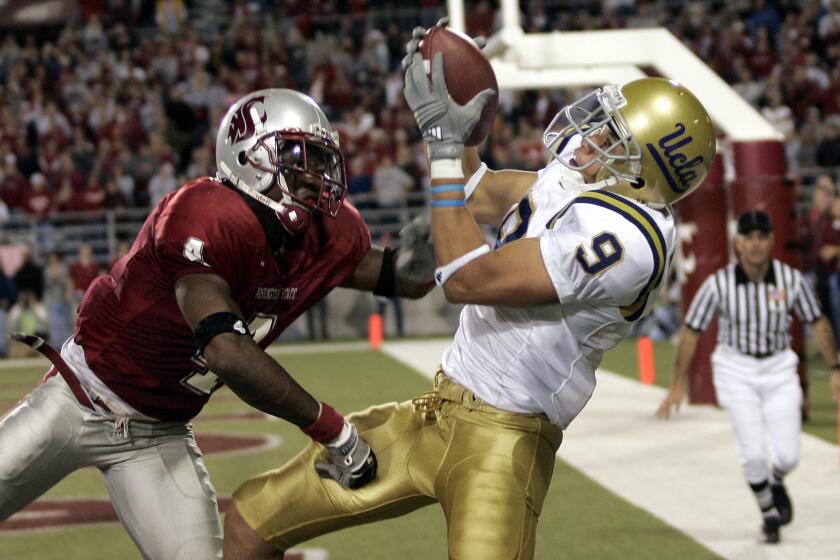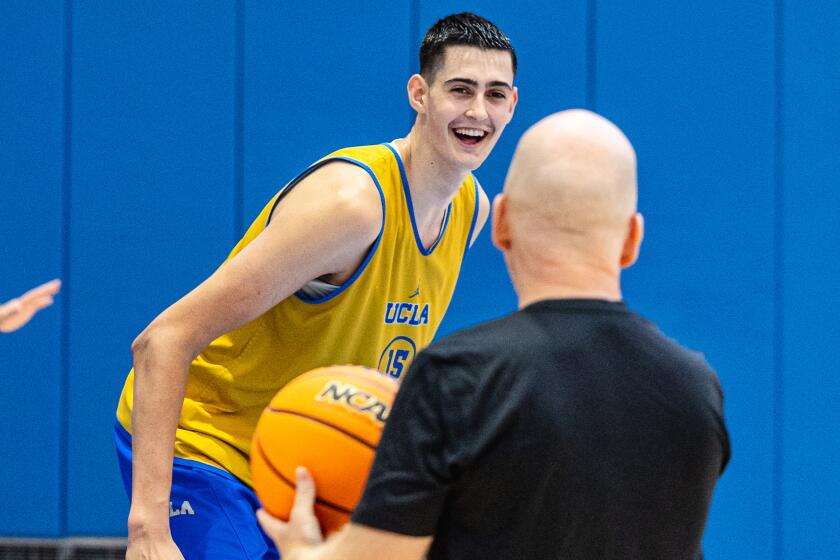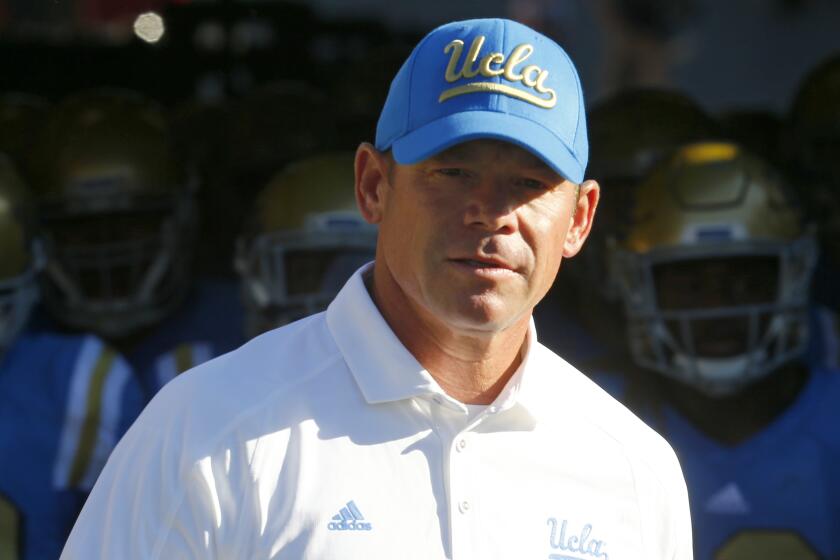Men of Westwood seeks to keep UCLA at the forefront of the NIL arms race
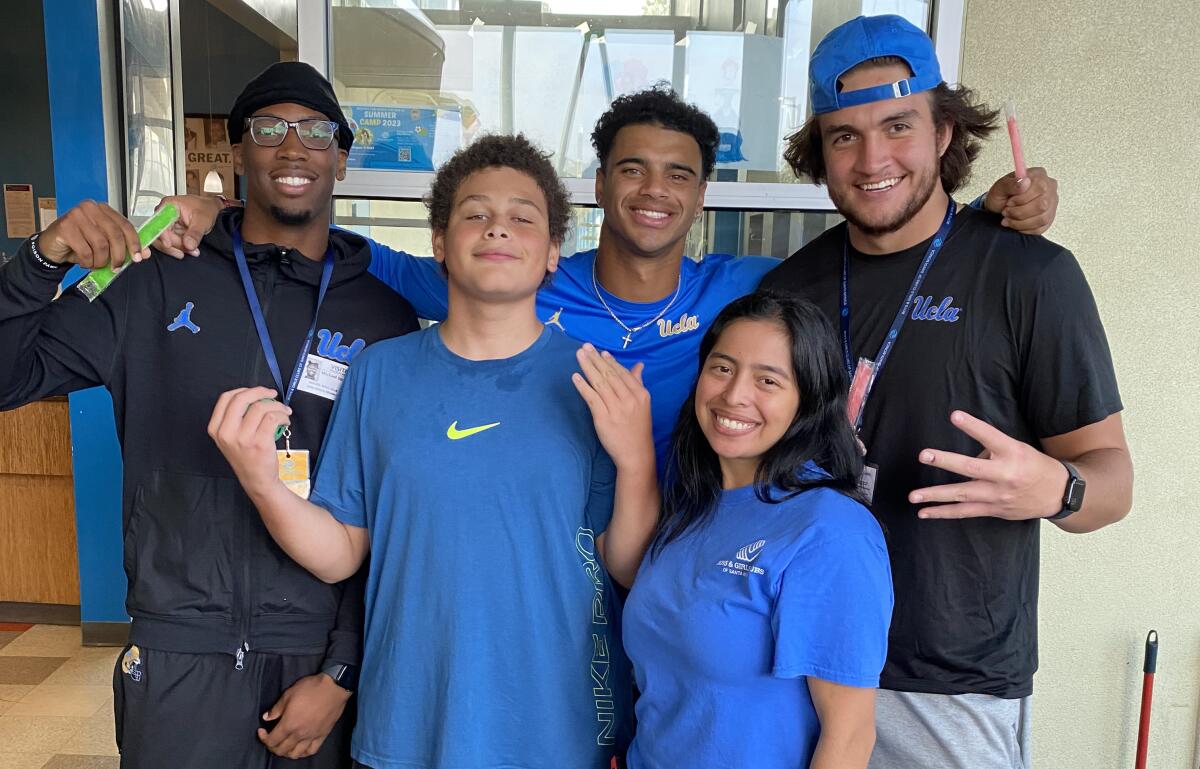
- Share via
Devastation hung over the three friends as they mulled the future of UCLA basketball in the bar of the team hotel. A medicinal round of drinks did nothing to improve their mood.
Attempts at consolation felt feeble. Along with players’ parents, they showered Jaime Jaquez Jr., Tyger Campbell and their teammates with applause when the Bruins disembarked from the team bus at the hotel after losing to North Carolina in the 2022 NCAA tournament.
Just as crushing as the defeat was the sense of despair. What could they do? Where did they go from here? Chaos had just begun to reign in a rapidly changing college sports landscape that now featured its own free agency. There was consensus about one thing.
“We can’t feel this way again,” Ken Graiwer, one of the three alums pondering what to do, said of the collective resolve.
As the clock pushed past 1:30 a.m., hope was born from helplessness. Graiwer and his longtime friends, Geoff Suddleson and Tyler Rutkin, seized upon being perfectly positioned to help their alma mater. As major athletic donors with courtside seats who traveled on team planes, they were trusted allies of coaches and administrators. They also understood what was needed: a new name, image and likeness collective that could compete with those in other bastions of blue-blood basketball.
A look back at the greatest five games in the UCLA vs. Washington State Pac-12 rivalry, including the Bruins’ stunning win over the Cougars in 2019.
A framework was hashed out, with Graiwer agreeing to spearhead the effort. The concept gained support from senior associate athletic director Josh Rebholz and additional donors on a private flight home the next day. By the time they landed in Los Angeles, momentum was building for what would become Men of Westwood.
A year and a half later, the official NIL collective of UCLA athletics has raised well into seven figures while significantly expanding its reach. Football came on board last November. Baseball was added last month. More is planned with the Bruins on the verge of moving to the Big Ten Conference, including a Champion of Westwood arm to support women’s sports and other Olympic teams. The collective also is on the verge of announcing several corporate sponsorships.
“We have a lot of ideas,” Graiwer said. “We’re just getting started.”
Among the newest concepts are special access experiences. How would you like to go to dinner with Dylan Andrews and hear about his hopes for becoming the Bruins’ next great point guard? Or take coach Mick Cronin golfing on his favorite course? Or use the Bruins’ practice court for your own pickup game? All are available, on a menu of experiences ranging from $1,000 to $20,000.
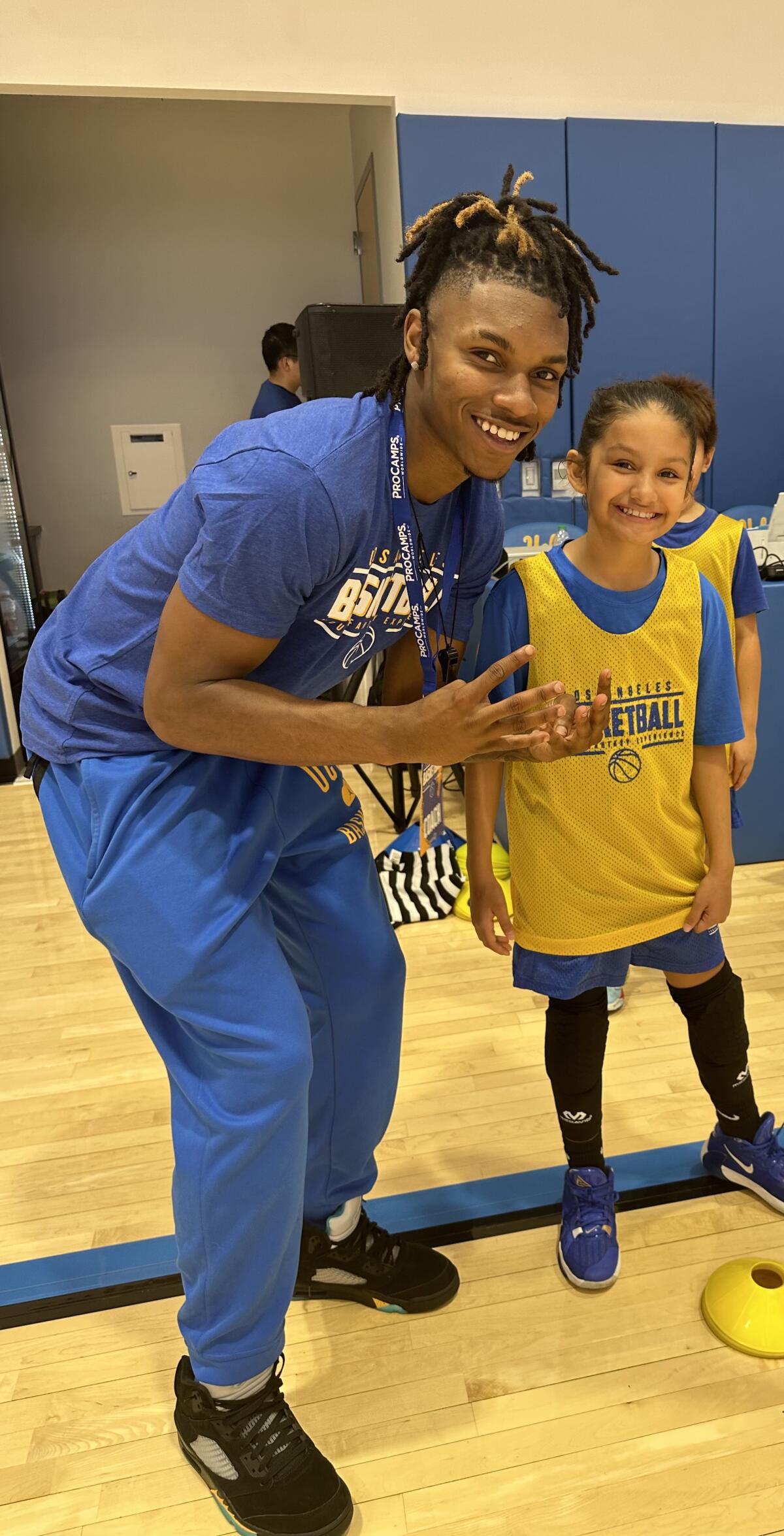
At UCLA’s homecoming football game against Colorado this month, Men of Westwood is putting together a VIP experience that will include tickets on the 30-yard line, collective-themed apparel and autograph sessions with former Bruins stars. That Deion Sanders will roam the Buffaloes’ sideline as maybe the best story in sports is a bonus.
Men of Westwood operates as a for-profit company because its organizers believe the Internal Revenue Service has not unequivocally stated that collectives are eligible for 501(c)(3) status as charitable organizations. Graiwer and his top lieutenants don’t take salaries so that as much of the money raised can directly go to athletes as possible; currently, they say that figure is more than 90% of proceeds because of operational expenses needed to get the collective running.
So far, basketball has outpaced football in fundraising. That’s hardly a surprise given basketball’s eight-month head start on donations and its status as the sport at UCLA.
Every player on the basketball team has a deal with Men of Westwood. A handful of baseball players have deals. Multiple football players have individual deals on top of the more than half the team who received payments for their participation at a camp.
Deals are structured in two ways — either as a lump sum based on an agreed-upon set of duties or payments tied to participation in events or promotions. Earning opportunities include public appearances, participation at camps, autograph signings, social media promotions, private lessons, charity events and commercials.
UCLA coaches plan to utilize the size and play of 7-foot-3 incoming freshman Aday Mara, and help develop his defense this season.
Some deals are in cash, others involve funding travel expenses for families to attend games. Men of Westwood would not disclose the value of any deals, citing confidentiality.
Jaquez, who is about to begin his rookie season with the Miami Heat, was active with the collective in his final season as a Bruin. He spoke to donors at a Selection Sunday event and taught basketball skills at a camp for underprivileged children. Jaquez said he appreciated the range of opportunities that Men of Westwood provided, including a seminar on finances.
“It helped me prepare for the future as a professional basketball player,” Jaquez said, “to understand how to manage and handle money.”
Of course, you have to make money before you can spend it. While visa restrictions bar the Bruins’ international players from NIL work in the United States, some were able to participate in clinics for underprivileged children and complete promotional work while abroad this summer.
The team showed up at a Los Angeles basketball camp in July even though the international players could not financially benefit. They came anyway, wanting to help the kids and hang out with their teammates.
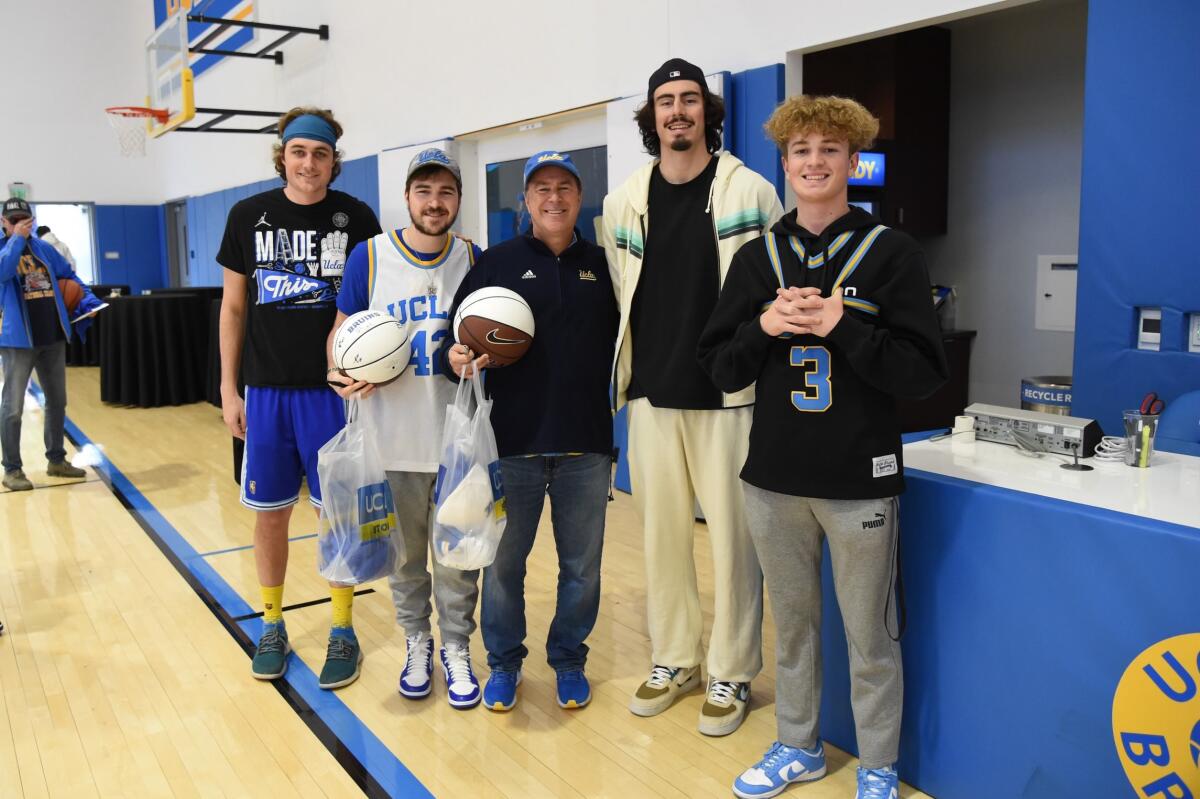
“That’s how they believe they should do stuff,” Graiwer said, “as a team.”
Last month, the collective announced it had hired Russell Stong IV, the beloved former walk-on guard, as an alumni representative in basketball donor relations. Among other things, Stong will represent Men of Westwood at events and give tours of Pauley Pavilion and the Mo Ostin Center, providing donors with a personal perspective of what their contributions mean to the team.
In some ways, UCLA could be considered the birthplace of NIL. Former basketball star Ed O’Bannon’s landmark 2014 court victory over the NCAA cleared the way for college athletes to be compensated for commercial use of their image. Other lawsuits and legislation followed, removing restrictions on paid endorsements and sponsorship opportunities.
Men of Westwood is capitalizing creatively. Besides Super Bowl and NFL and NBA draft watch parties, the collective plans to hold a World Series viewing party possibly attended by former Bruins stars and World Series participants Gerrit Cole and Brandon Crawford, subject to their availability.
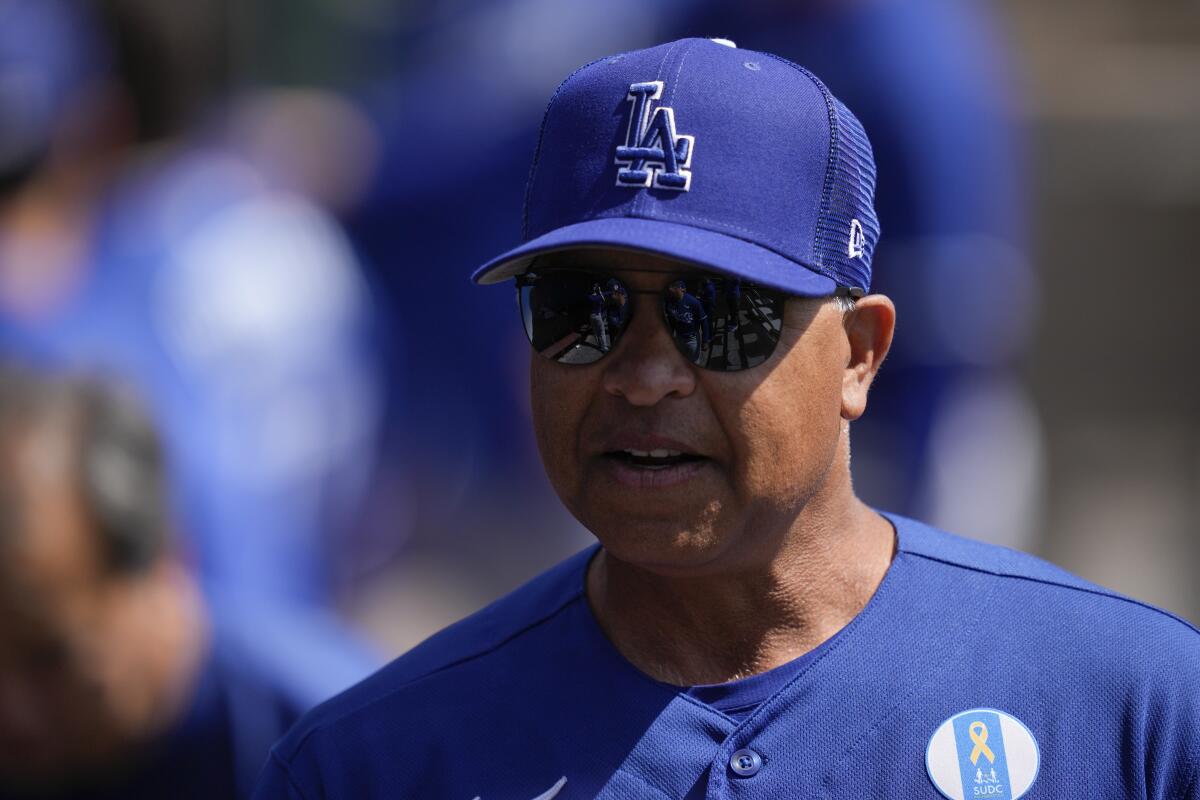
Additionally, Dodgers manager Dave Roberts, the former Bruins outfielder, is helping to arrange a Dodgers postseason experience that will include two tickets to the divisional round, pregame field access and a meet-and-greet with him. The manager also is donating game-worn memorabilia as well as a dinner and round of golf he will host.
Winning big in college sports no longer is just about hoarding four- and five-star recruits, but also collective dollars. The Times reported last year that BLVD LLC, the official collective of USC, has set a fundraising goal of $15 million per year. Utah’s 85 scholarship players just received renewable six-month leases on a Dodge Ram 1500 Big Horn truck — each with a retail value of $61,000 — via collective donations.
“You look at the top 25 teams in the country, and I would say you’re going to get the top 25 collectives,” Bruins football coach Chip Kelly said, “so it’s a money game now in college football. So whoever is paying the most is getting the most.”
Similarly, the coaches who put in the most effort seem to be getting the highest return. Four days after Kelly downplayed his role, saying “coaches aren’t allowed to be involved in collectives,” Cronin wore a Men of Westwood T-shirt when he met with the media Friday.
“Gotta be a billboard,” Cronin said, motioning toward the words on his shirt as he continued. “Support. I need the praying hands. Please, support Men of Westwood.”

Men of Westwood’s organizers know they must narrow the gap with counterparts at other schools that are spewing cash. Having raised millions, the collective has brought in only a fraction of the tens of millions it needs.
“This is a different era in college sports,” Graiwer said. “In order to compete at the highest level, UCLA donors and fans will have to step up and engage with NIL. Our goal at Men of Westwood is to show that with their support and by participating in NIL, they will have opportunities and access to the student-athletes like never before, including new benefits and experiences.
“A donor to NIL is now part of the program. They get to know the student-athletes on a personal level and really find out what amazing human beings we have here. And, as an added bonus, by providing our current student-athletes with NIL opportunities, we are showing recruits and potential new Bruins what it is like when they come to UCLA.”
Former UCLA football coach Jim Mora says he never told running back recruit Najee Harris he knew the identity of Tupac Shakur’s killer.
Part of the challenge the collective faces is educating fans and boosters who remain confused and conflicted about how best to split their contributions between Men of Westwood and the Wooden Athletic Fund, which allows tax write-offs and has been the longstanding recipient of donor dollars.
Graiwer and his executive team are big supporters of the Wooden Athletic Fund, each giving at least five figures annually. They realize the payoff for giving to Men of Westwood might not be as readily apparent.
“It’s a leap of faith,” Graiwer acknowledged.
The thinking is that a robust collective will draw better athletes, resulting in more victories and exposure — while also putting more money in the coffers of the Wooden Athletic Fund through bigger bowl games and deeper runs in the NCAA tournament, not to mention happier donors.
If nothing else, it will reward the Bruins who have brought their fans so much joy.
“We put in so much hard work, blood, sweat and tears into the program, want to make everyone proud and happy,” Jaquez said, “and to be able to have an opportunity to give back to those students and those players to help them out, I think everyone should be able to do that because they deserve it.”
More to Read
Go beyond the scoreboard
Get the latest on L.A.'s teams in the daily Sports Report newsletter.
You may occasionally receive promotional content from the Los Angeles Times.

